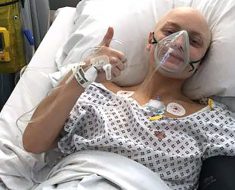Staff in the for-profit nursing homes run by Japara Healthcare have been ordered not to look in on residents overnight because making sure they are still breathing, or have not fallen out of bed, is "not a valid reason to check".
The new policy, which the company calls "Respecting Night Time for Residents – Etiquette Guidelines," describes the change as part of a "no wake" initiative.
Bev Myers mother fell out of bed during the night at a nursing home (not owned by Japara) and suffered terrible injuries to her arm, but was not found for some time.
But the nursing union's assistant secretary, Paul Gilbert, describes it as a thinly veiled excuse to reduce staff in Japara's nursing homes.
The new policy for the company, which runs 44 homes nationally, says that, "the entering of residents' rooms and or the visual 'checking' of residents on a periodic basis without an obvious and specific care need will not take place.
"Checking the resident is still breathing or has not fallen out of bed is not a valid reason to check the resident."
"The routine of 'doing rounds ruing the night shift is based upon a hospital culture, not a home environment – routine checks for safety and breathing are not necessary," says the circular, which was issued by the company's dementia strategist, Ben Gatehouse.
It also directs staff not to wake people unnecessarily, and to "prioritise residents' physical, emotional and personal comfort care needs over other tasks".
Residents can spend the night sleeping on chairs and couches in common areas as a "lifestyle choice" and that resident choice will be respected if they "choose not to sleep during the night".
A Japara spokeswoman told Fairfax Media that guidelines were "a very positive initiative as part of our dementia strategy," and were "based on clinical best practice and have been developed in response to resident and family feedback".
However, Mr Gilbert of the Australian Nursing and Midwifery Association said the document was "obviously just a mechanism to cope with a reduction in staff".
Japara was planning to increase its bed numbers in one Melbourne home from 72 to 128 by September, he said, while the number of registered nurses in the facility was reducing by one.
Mr Gilbert warned that nurses who followed the guidelines would expose themselves to actions for professional negligence if someone fell, or if dangerous bed sores developed because a resident was not being turned.
"It would constitute professional misconduct and I don't think relying on an employer's direction would save them," he said.
Bev Myers's mother, Barbara Pell, fell out of her bed at night in a for-profit nursing home (not run by Japara), breaking her forearm and stripping skin from it in what is called a "de-gloving". A sensor mat was supposed to be on the floor next to the bed to alert staff to a fall, but it was not.
“We knew it wasn’t there because there was blood on the carpet. They only discovered her at 9.05am when the day staff came in. We think she’d been there about 30 or 35 minutes,” Ms Myers said.
Bev Myers’ mother, Barbara Pell, shortly before she died last year.
“She went from being able to come out in my car and got to the pokies to a state where I couldn't physically get her into the car … her world just imploded … and mentally: I think she gave up.”
Ms Myers, who also trains workers for nursing homes, said if there had been no provision for having her mother checked overnight, "I wouldn't have left her in the home … I would have moved her somewhere else".
"I think that unless the resident has requested not to be disturbed, that's a breach of duty of care."
The Japara spokeswoman said, that, under the new guidelines, "we strive to create a calm and relaxing night-time environment", and, "we do not intrude into residents’ rooms or wake them unless they want us to or there is a clinical need".
Technology, such as motion sensors integrated into the call bell system "can alert staff immediately if a resident falls from their bed," the spokeswoman said.
Of staff numbers, the company said, "Nurse numbers can change in line with resident numbers and needs".
Monash University aged care specialist Professor Joe Ibrahim said there was an active debate about how to balance medical needs and personal dignity in nursing homes.
"The idea that all the doors are shut and they will not check until the morning, I don't think that's reasonable. Neither is it reasonable to open 100 doors and check 100 people just in case someone has fallen. The middle ground needs negotiation and consideration."
Source: Read Full Article






